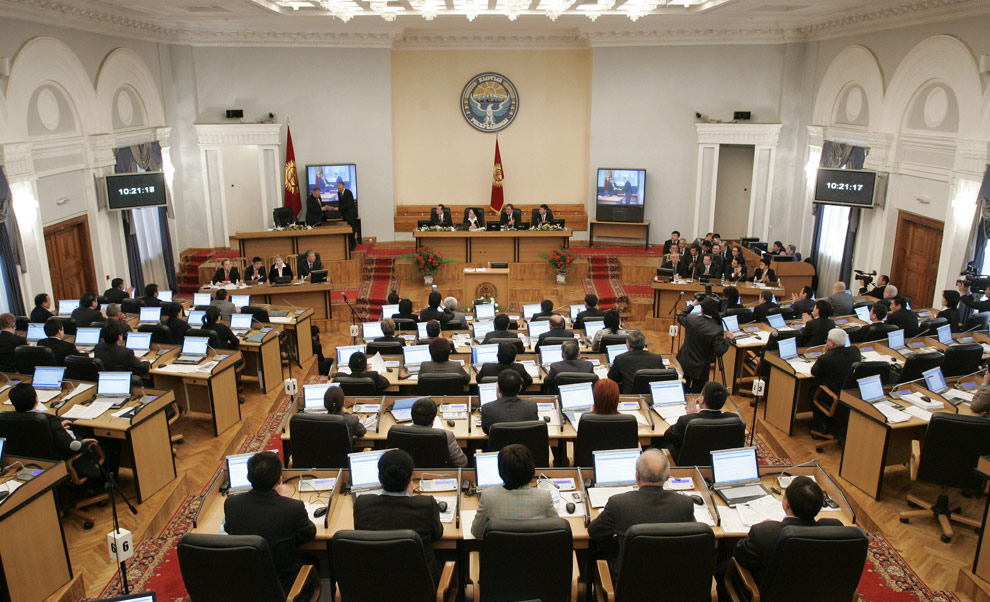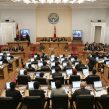
Kyrgyz Parliament to Form New Coalition
Publication: Eurasia Daily Monitor Volume: 8 Issue: 224
By:

Following the recent presidential election, Kyrgyzstan’s parliament is set to form a new ruling coalition. This will be yet another test as to whether the country’s political forces can find a balance between the competing interests among the five political parties represented in the parliament.
The country’s new President Almazbek Atambayev’s Social Democratic Party of Kyrgyzstan (SDPK) has declared that it wants to leave the coalition. In his address to the parliament, the faction’s leader, Chynybai Tursunbekov, said that the coalition members – SDPK, Ata-Jurt and Respublika – were not able to collaborate on important issues such as judicial reform and economic policy. “Therefore the SPDK is suggesting forming a new coalition,” he said (www.24.kg, December 7). Roza Otunabayeva, who recently stepped down from the presidency, agrees with the SDPK, arguing that the current coalition is extremely ineffective because of its internal divisions.
Some Members of Parliament (MPs) warn that Atambayev, although no longer an official party member, wants to boost his SDPK’s influence in the parliament, and would go as far as to hold new elections to secure more seats for the party. However, the president’s party will dominate in the parliament and most likely become part of a new alliance. At least three parties will need to be part of the coalition in order to form a parliamentary majority. In the best case scenario, the coalition will be formed fairly quickly with MPs voting for the new prime minister and government. In the worst case, the parliament will be dismissed, should it fail to unite in a new coalition after three attempts. It is in the interests of the president to ensure the prime minister is elected from the ranks of allied parties.
It took over two months for the coalition to be formed following the parliamentary elections in 2010. The first coalition collapsed after disagreements over the parliamentary speaker’s post. In the second attempt, coalition members sought to ensure the coalition survived, despite its internal disagreements. This time, none of the parties wish to hold another election any time soon, due to the great financial costs involved and the political risks associated with the new round of voting. Today, the SDPK is the only faction with strong internal cohesion among its members. The other four parties are submerged in inter-personal feuding among their members.
Omurbek Tekebayev, the leader of the opposition Ata-Meken party, is seeking the post of parliamentary speaker. In order to secure this, his party would need to fight for a place in the ruling coalition. Given that the party has the least number of seats in parliament, Tekebayev faces an uphill battle in the coming weeks.
Ata-Meken has challenged the current parliamentary speaker and member of Ata-Jurt party, Akhmatbek Keldibekov, with a no confidence vote scheduled for December 12 (www.akipress.kg, December 7). Tekebayev’s party accused the speaker of meeting with Kamchybek Kolbayev, a notorious criminal kingpin included in the White House’s “Kingpin act” (www.knews.kg, December 7). Based on these accusations, a special investigative committee was created that includes MPs drawn from all five parliamentary factions. Keldibekov’s party is mostly popular among ethnic Kyrgyz in southern Kyrgyzstan, who supported the Ata-Jurt leader Kamchybek Tashiev in the October 30 presidential election.
New attempts to form a coalition will once again highlight the north-south divide among the political forces in Kyrgyzstan. Regional divides cut across parties, as well as the various factions. For a new coalition it will be difficult to alienate Ata-Jurt – widely seen as a party that represents southern Kyrgyzstan. At the same time Respublika’s leader, Omurbek Babanov, has served as Atamabayev’s vice deputy prior to the presidential election. In an effort to form a new coalition and appoint the parliament, the SDPK should act as a uniting force that will bridge the north-south political divide. Similar to earlier coalition deals, the key government posts will be distributed among political leaders from the south: either the post of prime minister or that of parliamentary speaker will be taken by a candidate with a strong southern constituency.
Despite the uncertainty over the future of the parliament’s coalition, MPs are trying to follow legal procedures in dealing with political crises. Overall, Kyrgyzstan has been more stable with the current parliament compared to one year ago.




